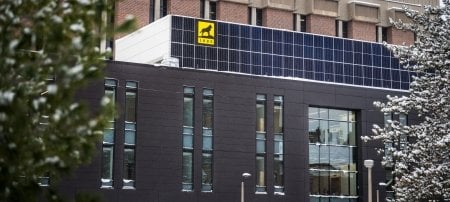At its regular meeting on Friday, October 20, 2017, Michigan Technological University’s Board of Trustees approved a five-year state capital outlay plan and capital project request including three projects: phase one and two of a H-STEM engineering and health technologies complex and integrated student maker spaces.
Phase 1 of the H-STEM Engineering and Health Technologies Complex is the top-ranked project. It is expected to cost $44.7 million, of which state funds would cover $29.7 million and Michigan Tech would be expected to contribute $15 million or approximately one-third.
The plan and fiscal year 2019 project request will be submitted to the State of Michigan, as required by law. This is the first step the University must take to request funding for construction and renovations.
If approved for construction planning by the State, phase one—which would include drafting of blue prints and leveraging state funds for additional funding gifts for naming opportunities—would start in 2018.
Health, Science, Technology, Engineering, Math
H-STEM stands for Health, Science, Technology, Engineering and Mathematics. The complex will support a variety of educational programs that apply engineering and science to health and other problems related to the human condition.
The University’s unique technological niche places Michigan Tech in an ideal position to contribute to human-centered research, development and education by developing therapeutic devices, sensors, instruments, preventive strategies and a health technologies-related workforce, said President Glenn Mroz.
The complex will permit teams of researchers and students from any Michigan Tech department or center to work together in flexible lab spaces with shared equipment.
Human-centered research at Tech is already supported by the American Heart and Lung Associations, Gerber Foundation, Portage Health Foundation, National Institutes of Health, and National Science Foundation, among others.
"Current economic projections indicate that demand for technological innovations related to the way that humans interact with technology, as well as human health, is going to grow substantially,” said President Mroz.
In other business, the Board:
- Voted to award honorary Doctor of Philosophy degrees to James J. Parm and Robert G. White. Parm, a Michigan Tech alumnus, will give the Commencement address in December. He was president and CEO of Stratos until his retirement in 2013. White is a long-time trustee of the John Edgar McAllister Foundation. He has been instrumental in continuing the late McAllister’s commitment to providing scholarships for Canadian citizens who want to study at Michigan Tech. He was also a key person in the Foundation's decision to support the construction of the John Edgar McAllister Welcome Center, which now houses the Admissions Office. The Center is often the place that prospective students and their families visit when coming to campus for the first time.
- Heard a report that research funding and sponsored programs received during FY17 totaled $59.7 million, $8 million more than the previous year. This is an all-time high for the university.
-
Appointed Jinshan Tang to full professor with tenure in the School of Technology.
- Heard a report that $5 million was raised by Advancement and Alumni Engagement from July 1 through August 31, 2017. That is 14 percent of the University’s fundraising goal for FY18. The annual faculty/staff Campus Campaign kicked off September 18. Last year, 28.8 percent of employees participated, up from 26.6 percent in FY16 and 22.3 percent in FY15. The goal is to continue to increase participation.
- Learned Michigan Tech and the Michigan Tech Fund received a clean report from their external auditor, Andrews Hooper Pavlik. A clean audit indicates the financial stability of the University.
- Was informed that six Michigan Tech labs have volunteered to host researchers displaced by recent hurricanes. They include David Shonnard, Chemical Engineering; Rudy Luck, Chemistry; Myounghoon "Philart" Jeon, Cognitive & Learning Sciences; Paul Sanders, Materials Science & Engineering; Zhanping You, Civil & Environmental Engineering; and Guy Meadows, Great Lakes Research Center.
- Heard a report on the progress of the presidential search.
Michigan Technological University is an R1 public research university founded in 1885 in Houghton, and is home to nearly 7,500 students from more than 60 countries around the world. Consistently ranked among the best universities in the country for return on investment, Michigan's flagship technological university offers more than 120 undergraduate and graduate degree programs in science and technology, engineering, computing, forestry, business, health professions, humanities, mathematics, social sciences, and the arts. The rural campus is situated just miles from Lake Superior in Michigan's Upper Peninsula, offering year-round opportunities for outdoor adventure.






Comments